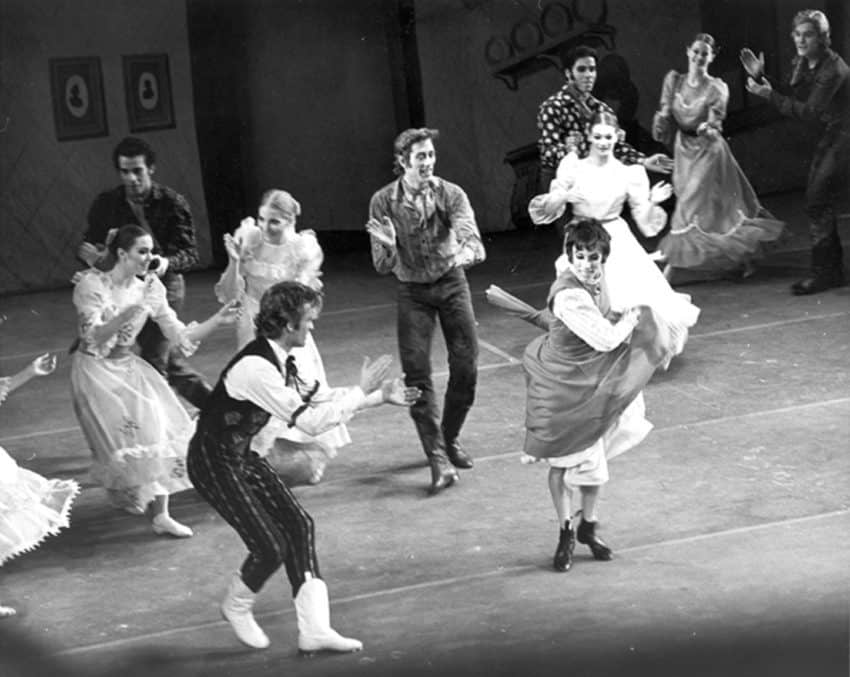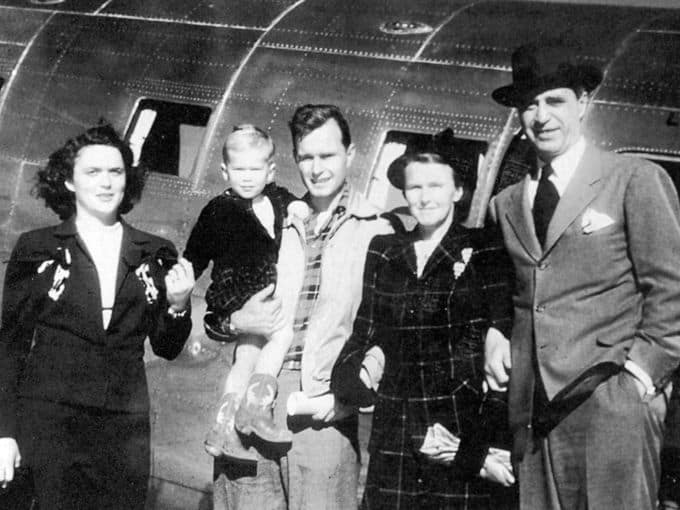
Louis Peres, photographer. ABT dancers rehearsing Agnes de Mille’s Rodeo, 1960. This was the same ballet that premiered in 1942, during World War II. American Ballet Theatre Collection, Music Division, Library of Congress (029.00.00) http://www.loc.gov/exhibits/american-ballet-theatre/images/ab0029_enlarge.jpg
By: Phil Kohn. Dedicated to the memory of his father, GM3 Walter Kohn, U.S. Navy Armed Guard, USNR, and all men and women who have answered the country’s call in time of need. Phil can be contacted at ww2remembered@yahoo.com.
Naval convoys on October 16, 1942, converge for “Operation Torch,” the Anglo-American landings on French North Africa. Allied leaders agree on a plan to obtain the cooperation of Vichy French military officers there. In Warsaw, German authorities hang 50 Polish communists and display their bodies as a warning. The Aaron Copland-Agnes DeMille ballet “Rodeo” premieres in New York City. The U.S. National Boxing Association freezes the titles of all its champions serving in the armed forces. The character “Mighty Mouse” debuts in the 20th Century-Fox Terrytoons cartoon, “The Mouse of Tomorrow.”
U.S. forces on Guadalcanal receive 32 additional aircraft on October 17. In Stalingrad, the Germans finally take control of the bitterly contested tractor factory. On Papua-New Guinea, an Australian advance northward from Port Moresby runs into fierce Japanese resistance. In the Aleutians, the Japanese destroyer Oboro is attacked and sunk by American planes off Kiska Island.
American and Australian troops invade the southern tip of Papua-New Guinea on October 18 and begin fighting their way up the island. In Europe, Hitler orders German troops to summarily shoot all captured Allied commandos “to the last man,” even if they are in uniform and have surrendered. In the Crimea, the advance by German Army Group A toward the Black Sea port of Tuapse is halted due to difficult terrain and stubborn Soviet resistance. An advance party of four Norwegian Special Operations Executive (SOE) commandos are dropped by parachute to reconnoiter the area around the German “heavy water” plant at Telemark, Norway. The facility is important to the Nazi atomic-weapon development program. (The SOE is a British organization whose purpose is to conduct espionage, reconnaissance and sabotage.)
On October 19, Vice Adm. William “Bull” Halsey, USN, replaces Vice Adm. Robert Ghormley, USN, as Area Commander, South Pacific. In Washington, the War Department agrees to provide equipment for another 30 divisions of the Chinese Army. Soviet forces along the Don River launch an offensive.

Prescott Bush, right, was a founding member and one of seven directors (including W. Averell Harriman) of the Union Banking Corporation (holding a single share out of 4,000 as a director), an investment bank that operated as a clearing house for many assets and enterprises held by German steel magnate Fritz Thyssen. In July 1942, the bank was suspected of holding gold on behalf of Nazi leaders. A subsequent government investigation disproved those allegations but confirmed the Thyssens’ control, and in October 1942 the United States seized the bank under the Trading with the Enemy Act and held the assets for the duration of World War II. Journalist Duncan Campbell pointed out documents showing that Prescott Bush was a director and shareholder of a number of companies involved with Thyssen. From left, Barbara Bush, future president George W. Bush, future president George H.W. Bush, and Dorothy Walker Bush. https://en.wikipedia.org/wiki/Prescott_Bush.
The U.S. government, under authority of the “Trading with the Enemy Act,” on October 20 orders the closure of the banking operations of the Union Banking Corp., in New York City, and seizes its stock shares. The bank is alleged to operate as a clearing house for the assets and enterprises of German steel magnate Fritz Thyssen, and is suspected of hiding gold for Nazi leaders. In the Solomon Islands, the heavy cruiser USS Chester is torpedoed by Japanese submarine I-167, killing 11 sailors and injuring 12. The vessel limps into Espiritu Santo, in the New Hebrides, for emergency repairs.
The U.S. Congress on October 21 passes the Revenue Act of 1942, a measure that calls for nearly $7 billion in new individual income taxes (a near doubling of federal taxes) and lowers the personal exemption drastically enough to bring some 13 million new taxpayers into the system. By the end of the war, taxes paid by individuals will total more than the amount paid by corporations — the beginning of a new trend in American tax history. Off Lindesnes, Norway, the German transport vessel MS Palatia is sunk by an RAF Handley Page Hampden torpedo bomber. Palatia is carrying 999 Soviet prisoners of war to work as slave laborers in Norway, 916 of whom perish in the attack.
In London, a royal proclamation is signed on October 22 that reduces to 18 the British call-up age for military service. Over Italy, the British Royal Air Force launches the first of a series of raids on the industrial areas around Turin, Milan and Genoa. In Russia, the first snow falls at Stalingrad. In the Pacific, Australian troops invade Goodenough Island, 15 miles northeast of Papua-New Guinea, attacking the Japanese Special Naval Landing Force located there. The strategy is to deny the Japanese use of the island during the Buna-Gona Campaign on Papua-New Guinea.







